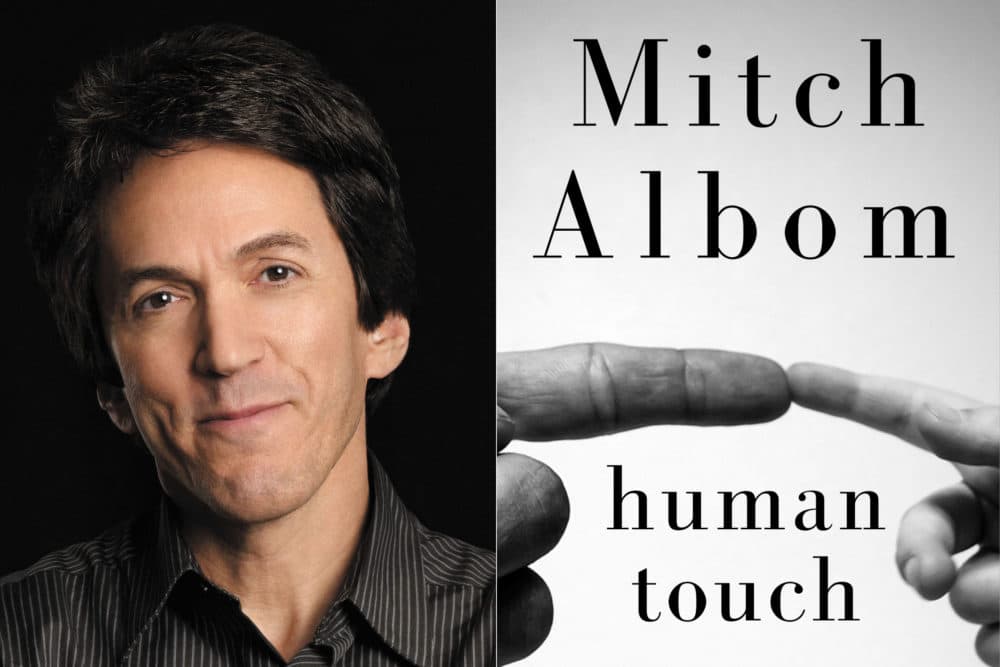Advertisement
Mitch Albom Writes New Book, 'Human Touch,' To Fundraise For COVID-19 Relief In Detroit

Award-winning author and philanthropist Mitch Albom is known for his best-selling works “Tuesdays with Morrie” and “The Five People You Meet in Heaven,” both of which explore what it means to be human.
Now, in the midst of COVID-19, Albom has released a new book — chapter by chapter — that he wrote in real time.
“Human Touch” is free to read online. Instead of paying for access to the novel, Albom encouraged readers to donate to his charity Say Detroit’s initiative, Detroit Beats Covid-19!, which is helping the city fight the virus through a multitude of ways, including food access, shelter and testing.
As the coronavirus began to take hold in his home city, he says he felt compelled to act.
“We're set up in the worst-case scenarios — a lot of intergenerational housing, a lot of people close together, a lot of people with hypertension and diabetes and preexisting conditions,” he says of Detroit. “So I said, ‘Well, what can I do to help my city and raise some money?’ ”
The money needed to be raised quickly to have a direct impact on helping Detroiters affected by the virus, so he decided to publish the book online. He also chose a storyline that was flexible enough for him to expand on each week.
Charging for the book was never an option because he didn’t want to turn folks away. Instead, he “took a chance” and encouraged readers to donate if they could.
That leap of faith has worked — he says donations through the book have raised well over $600,000.
“It's just so interesting that you do something for free from your basement, essentially, and you can help affect the world in a weird way,” he says. “It's a message I always try to get through my books.”
Because of donations, Albom’s Detroit Beats COVID-19! charity has been able to assist the city in key areas: feeding 2,000 senior citizens weekly, funding PPE for frontline workers, supporting operations at a quarantine center for homeless Detroiters who have the coronavirus, feeding and educating 100 children in need, and operating a COVID-19 mobile testing center.
Advertisement
“COVID-19 isn't gone. The sun's out, but it's not gone. And we're still fighting it here. So I hope we can continue,” he says.
“Human Touch” tells the story of four different Michigan families, who all live on the same street corner during the coronavirus pandemic. Their neighborhood street corner is “symbolic of how we're all kind of living apart, yet living together,” he says.
One family includes a doctor and a pastor to explore how faith is impacted during the pandemic. Another family is Chinese-American to address the “blaming and scapegoating of Chinese Americans” for the coronavirus, he says. Another house consists of a cider mill owner. Then, there’s the “star of the book” — Moses, an 8-year-old Haitian boy.
Pre-coronavirus, these four families would gather together every Saturday at each other’s houses — eating, hugging, playing and being together as neighbors. But the virus started to unravel those relationships, as Albom saw happening in his own community.
“Now, all of a sudden, they slowly had to separate, and people became distrustful of one another. Somebody got the disease in one family and they were concerned about getting it elsewhere,” he says. “And this was really what was playing out in the streets around me.”
But little Moses — along with the human touch — act as miracles during unprecedented times. Moses is immune to the disease, so as his neighbors begin to quarantine, he’s able to physically comfort those who are sick with the coronavirus.
Moses’ character stems from a connection Albom has made with an 8-year-old Haitian boy named Knox. Albom operates Have Faith Haiti Mission & Orphanage, a place that raises orphaned children in a nurturing environment. He brought Knox to the U.S. for a therapy session on his leg on March 1, but then the pandemic swiftly changed any plans to head back to the Caribbean country.
Knox “has lived with us ever since, and he has been the absolute joy of our existence,” Albom says.
Albom and his wife Janine Sabino realized that Knox’s “upbeat, funny and curious” personality — and his human touch — made socially isolating bearable.
“It's being able to hold him and hug him and play with him has made this tolerable for us...” he says. “Children really can be a way out of this.”
Human touch and connection, a common theme throughout his novels, can go a long way. Take Here & Now’s Tonya Mosley’s story, for example: Albom is one of the reasons she’s a journalist.
When Mosley was 11 years old, she would read Albom’s Sunday sports columns in the Detroit Free Press and would rewrite them on a Brother word processor, a gift from her grandfather.
She’d also write letters to Albom — and he would write back. He says he would always try to correspond with young people who sent him mail.
Those messages had a big impact on Mosley, who went on to become a reporter and radio host. Her story is evidence of how vital connectivity is for human beings, Albom says.
“One person touches another person, touches another and another and another,” he says. “We have no way of knowing the ripples in the pond that we create by the pebbles that we throw.”
Cristina Kim produced this story and edited it for broadcast with Peter O'Dowd. Serena McMahon adapted it for the web.
This segment aired on June 22, 2020.

